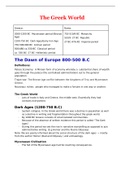The Greek World
Greece: Rome:
2000-1200 BC Mycenaean period (Bronze 753-510/9 BC Monarchy
Age) 510/9- 27 BC Republic
1200-750 BC Dark Ages/Early Iron Age 27 BC-476 AD Imperial period
750-500/480 BC Archaic period
500/480-ca.330 BC Classical period
ca. 330 BC- 27 BC Hellenistic period
The Dawn of Europe 800-500 B.C
Definitions:
Palace Economy: A Minoan form of economy whereby a substantial share of wealth
goes through the palace (the centralised administration) out to the general
population.
Trojan war: The Bronze Age conflict between the kingdoms of Troy and Mycenaean
Greece.
Nouveaux riches: people who managed to make a fortune in one way or another.
The Greek World
- Lots of trade in Italy and Greece, the middle east. Essentially they had
contacts everywhere.
Dark Ages (1200-750 B.C)
- System collapse. In the Greek world there was a decline in population as well
as a decline in writing and fragmentation throughout the greek world.
- By 1000 BC Greece consists of small isolated communities.
- Because of the absence of written evidence this period is called “The Dark
Ages”.
- During this period we see the rise in narrative storytelling as opposed to just
administrative writing. (E.g Homer and the Iliad & Odyssey).
Note: We are poorly informed about the social structure of the dark ages → mostly
from the author Homer (Iliad and Odyssey ) and archaeology.
Mycenaean Civilisation
- The fall of the Mycenaean age had far-reaching consequences.
, - The strictly organised palace economy collapsed (and never reemerged).
- The population of Greece shrank and (a once so splendid culture) became
severely impoverished.
- The period is also the time of the invasion of the Dorians, who settled in the
Peloponnese, on Crete and in southwest of Asia minor.
- It is assumed that the Trojan war occurred at the height of Mycenae's wealth,
however, it remains unclear.
- Language only for administrative purposes (Linear B script passed into
oblivion, it was rediscovered at the end of the 19th century, when tablets
came to light in excavations).
Homeric Society
- Homer’s account differs to that shown in the Linear B tablets but is a
reflection of his world and subsequent centuries; what can be seen is that
instead of the King being the leader in the palace economy but a wealthy
landowner who was the primus inter pares (first among equals).
- The King peers were also landowners and military power rested on them
(they could afford weaponry like a chariot).
- The rest of the population had little influence on military affairs.
- The values of the aristocracy (mentioned above) had a profound impact on
Greek mentality; there was a sense of proving oneself, competitiveness being
strong and able-bodied
- An example of this is the Olympic Games which was first held in 776
BC.
- 1200 B.C see a lot of migration, especially in the eastern part of Troy, led to a
lot of destruction.
- The elite maintained contact with other areas especially in the eastern
Mediterranean, for example Cyprus.
Archaic Period - Greece (c.750- 500 BC)
Note: Also known as the Iron age (essentially when tools and weapons were made
out of Iron).
- The Archaic period was a time of new developments and changes - cultural,
demographic, economic, social and military changes.
Globally
- During this period there was increased contact with the Near East (Lebanon,
Israel, Mesopotamia), Egypt, Cyprus and the Phoenician coast.
- Through such contact you can see the Eastern influences on Greek art and
culture
, - Specifically, the Phoenicians brought about new types of grains.
- Also introduction of iron tools from the near east ( Phoenicians good at
metal work).
- Orientalizing style.
- During this period we see a growth in population (starting in 900 BC).
- An increase in sophistication
- E.g huts evolving into houses, wooden structures replaced by stone,
villages grew into towns and cities.
- Due to population increase changes in farming practices became a necessity
- Improved grain cultivation to feed the vast and growing population,
also products from the middle east.
- Sea trading and piracy are also suggested to have increased.
- Rise of the polis (from Phoenicians).
- Cities became a hub for trading of luxury goods coming from the near east
which was bought by wealthy elites.
- Colonisation (from the Phoenicians).
The polis
- Villages in the same regions started to collaborate and gradually developed
into a poleis.
- Polis (= City-states) all independent even if they share same culture/ religion.
- An autonomous* political community, including an urban core surrounded by
territory (usually relatively small).
*autonomous = political, military, and economic independence
- Typically with a central akropolis (stronghold/ fortified hill), sanctuaries, and
an agora (common public place) and chora (farmland surrounding the main
town).
- Some poleis were walled, but not all – many poleis would have looked like
simple villages.
- Most poleis were governed by officials with specific responsibilities (e.g
military leadership, jurisdiction, supervision of religious practices..).
- Some poleis were ruled by kings (e.g. Sparta).
- The polis was of extreme importance to its occupants (politai = male citizens)
- regarded life in a polis as the most ideal form of existence, didn’t like the
idea of a large empire.
- In most poleis the noble landowner monopolized the political offices
- Ownership of a land was justified by family claim to ancestral land →
oikos (household including parents, children, grandchildren and
sometimes slaves) very important, especially if they descended from a
famous ancestor.






